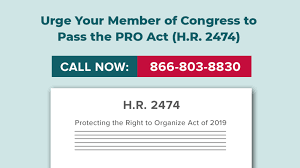
The House of Representatives passed the Protecting the Right to Organize or PRO Act last month. If the bill is enacted, it would make it much easier for workers to form unions.
The bill also used the worker-friendly ABC test to define employees under the National Labor Relations Act. (NLRA) The ABC test is the cornerstone of California’s Assembly Bill 5 which extends employment protections, including workers’ compensation, to gig economy workers.
I support the PRO Act. Our firm works with many unions on workers’ compensation claims. Union workplaces tend to be safer workplaces and unions give employees job security above and beyond what non-union employees have under the employment at-will doctrine.
But I don’t think the PRO Act went far enough. I believe the PRO Act should have applied the ABC test for the purposes of federal taxes like unemployment, Social Security and Medicare. I believe that for a few reasons.
One, more tax revenue to those programs would help maintain their solvency. Two, while states control who is an employee for the purposes of workers’ compensation, the fact that an employer pays taxes on an employee makes it more likely an employee will be defined as an employee. Federal tax laws can be a thumb on the scale for workers under state laws like workers’ compensation.
I think the PRO Act’s silence on Social Security and Medicare opens the door for mischief if it is enacted as drafted. Gig economy workers organized into a union without the benefit of basic social insurance programs may be forced to accept cut-rate “portable benefit” packages in lieu of standard mandated benefits like workers’ compensation. Poorly designed portable benefit plans can shift the cost of work injuries onto workers – particularly those are not covered under state workers’ compensation laws. The tech industry has collaborated with former SEIU President Andy Stern to support these types of weak portable benefit programs.
The PRO Act is DOA in the Senate. I think it is unlikely the President would sign the bill on the off-chance it did pass through the Senate. But there is an election coming up in November. It is well within the realm of reason that come next year there could be a Democratic president and a Democratic congress. Would Democrats enact something like the PRO Act if they had the opportunity next year or in 2022? It probably depends on who the Democratic president would be.

